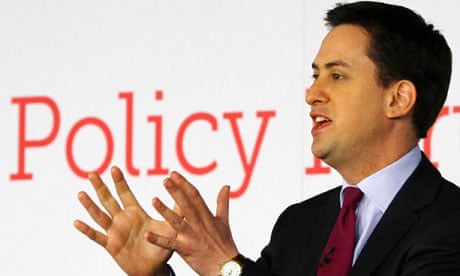Ed Miliband today accuses the coalition government of "cultural vandalism" over university tuition fees as he seeks to reinvigorate his struggling leadership and exploit the growing crisis in Liberal Democrat ranks on higher education.
Before a week of student protests and a crucial Commons vote on Thursday, the Labour leader takes the high-risk option of restating the case for a graduate tax despite the vocal opposition of his shadow chancellor, Alan Johnson.
In a full frontal attack on the coalition's proposals to lift the cap on fees to £9,000 a year he also argues that the plan will set back the cause of social mobility by a generation by entrenching "privilege and inequality" and discouraging students from lower and middle-income families from going to university at all.
The comments suggest the Labour leader has decided to appeal directly to the youth vote as he seeks to define, and inject steel, into his leadership.
Writing in the Observer, Miliband dismisses the coalition's argument that the rise in fees is "unavoidable", saying it could have been contained to a few hundred pounds a year – as opposed to allowing annual fees to rise by up to £6,000. "This is not unavoidable, it is a political choice and a deeply damaging one," he says. "The proposals amount to a rejection of the long-standing recognition of our collective responsibility for higher education."
Miliband's decision to choose fees as a defining issue risks dividing his party. Yesterday the shadow chancellor defied his leader by saying Miliband's preferred graduate tax could not work. Johnson told the Daily Telegraph: "I feel it is going to be very difficult to make a graduate tax a workable option."
The Tories immediately pounced on the remarks as evidence of Miliband's lack of authority. Tory deputy chairman Michael Fallon said Labour's leader had "no authority" in his shadow cabinet.
The issue of student fees was also continuing to split the Liberal Democrat party, whose MPs all signed a pledge before the May general election promising to vote against any rise.
In an interview with the Independent on Sunday Deputy Prime Minister Nick Clegg said he would like his MPs to back the government policy to increase fees in Thursday's Commons vote. But he admitted there was still no agreement.
Clegg said he found it "immensely frustrating" that people were claiming the policy would increase barriers to entry to university when he was convinced it would lower them.
He claimed Miliband and the National Union of Students were "not being straight" arguing that their support for a graduate tax would mean higher payments for many. "It's now time for the NUS and Ed Miliband and others to just come clean about what their proposals are, and then in an open contest compare it to what we are doing," Clegg said.
Aaron Porter, president of the NUS, described the opposition to coalition fee hikes as an "unprecedented campaign". There are plans for more mass protests on Monday, Wednesday and Thursday – while NUS members across the country will target Lib Dem MPs they believe could still be persuaded to vote against the plans. "We are within a handful of votes of defeating the government on this issue, and we have been overwhelmed by indications of support," said Porter.
"We will be sending a clear signal to the government – stick to your promises, or face a backlash at the ballot box."
Lib Dem leaders are preparing for the assault, while also trying desperately to persuade MPs that the package is a good one. They unveiled more details of a £150m scholarship scheme that will pay the first year of tuition fees for 18,000 of the poorest students.
In addition, they will explain that any university wanting to increase fees above £6,000 will have to show that it is giving places to those students, and then match the government funding and pay for their third year of fees. That would leave the poorest taking out loans for just one of their three years at university.
Aides say that Clegg, Vince Cable and Danny Alexander will have further discussions over the weekend about how the party will vote.




Comments (…)
Sign in or create your Guardian account to join the discussion